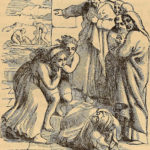We run our website the way we wished the whole internet worked: we provide high quality original content with no ads. We are funded solely by your direct support. Please consider supporting this project.
Violence: What Did Jesus Do?
Here’s a spot-on reflection on what Jesus taught us about responding to violence. Whatever you think about the justification of violence in particular situations, as Christians we simply cannot escape the fact that Jesus demonstrated another way.
From the reflection:
And though he had access to unlimited power to have himself released from the post on which they had nailed him and had hoisted him up high from the ground … he did not exercise that power at all, choosing instead to voluntarily die with a prayer on his lips for his murders’ forgiveness.
Two questions come to my mind:
(1) How did I miss all of this for most of my life as a Christian?
(2) Is the record of my Lord behaving so merely a record of his unique life and experienceor were they recorded and intended to teach all who would follow Jesus as to how we can follow him in the face of violence?
Category: General
Tags: Cruciform Theology, Jesus, Non-Violence, Suffering, The Way of the Cross, Upside-Down Kingdom
Related Reading

Why Did Jesus Command His Disciples to Arm Themselves With Swords? (podcast)
In this episode Greg looks at the command in Luke 22 to buy a sword. Episode 46 http://traffic.libsyn.com/askgregboyd/Episode_0046.mp3

Who Killed Ananias and Sapphira? A Response to Paul Copan (#6)
In his critique of Crucifixion of the Warrior God (CWG), Paul Copan makes a concerted effort to argue that the God revealed in Jesus Christ and witnessed to throughout the NT is not altogether non-violent. One of the passages Copan cites against me is the famous account of Ananias and Sapphira falling down dead immediately…

A Cruciform Magic Eye
In this post I’d like to share the story of how I came upon the thesis I’m defending in the book I’ve been working on for the last four years entitled The Crucifixion of the Warrior God: A Cruciform Theological Interpretation of the Old Testament’s Violent Divine Portraits. It’s a much longer post than usual,…

Living Incarnationally
The Christian faith is centered on the belief that in Jesus Christ God became a human being. This is commonly referred to as the doctrine of the incarnation. It means that in Jesus, God became embodied. God left the blessed domain of heaven, was born in Bethlehem, and took on our humanity that we might…

What to Do If You See God as Violent
God really is as beautiful as he is revealed to be on Calvary. Communicating this is my goal in everything I write—especially Crucifixion of the Warrior God and Cross Vision. But for many, to see him as being that loving, is not easy. We have to make a concerted effort for our brains to adjust…

The God Who Stoops
The way that one imagines God can be thought of along the lines of a Rorschach test. That is, I submit that the way a person imagines and experiences God says at least as much about that person as it does God. The more estranged people are from God, the more their knowledge of him is…

